Fire Breaks Out In Eastern Iran's Birjand Refinery Reservoirs
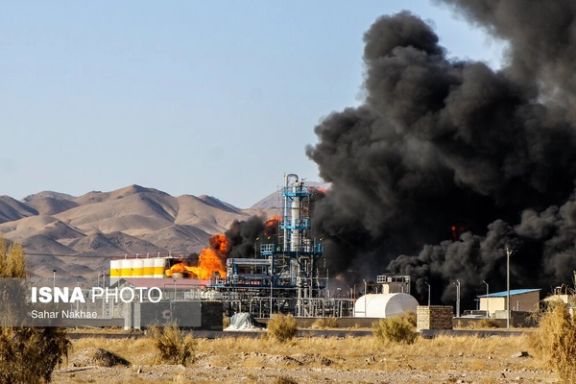
Refinery reservoirs in the Birjand special economic zone in eastern Iran caught fire on Sunday, as reported by Iran's state media.

Refinery reservoirs in the Birjand special economic zone in eastern Iran caught fire on Sunday, as reported by Iran's state media.
The Islamic Republic News Agency (IRNA) conveyed that firefighters were promptly dispatched to combat the flames at the mini-refinery, with visible smoke extending several kilometers.
Authorities issued an evacuation order for a nearby factory as firefighting forces worked relentlessly to control the situation. Mohammad Ali Akhoundi, the director-general of Iran's South Khorasan Province's crisis management department, noted that "operational vehicles" were mobilized to extinguish the flames, emphasizing the urgency of the response due to the potential threat to life.
The cause of the incident remains unknown, though similar events in the past have often prompted speculations of domestic or foreign sabotage. Notably, numerous unexplained explosions and fires have occurred at various Iranian military, nuclear, and industrial facilities, including pipelines and refineries, since mid-2020.
On January 28, a significant fire erupted at an Iranian military industrial factory, suspected to be the result of a drone strike in Esfahan.
While authorities have not provided comprehensive explanations for the incidents, they have attributed several high-profile sabotage attacks on facilities to Israel. However, Israel has not officially claimed responsibility for any of the events.
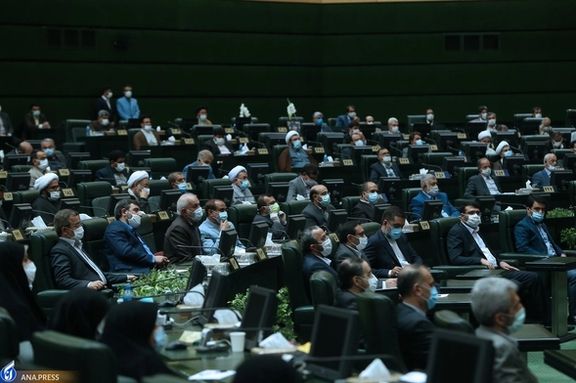
Iran's parliament has given its approval for a bill aimed at fostering cooperation with Russia in the realm of information security, as both countries are accused of extensive cyber attacks.
The bill, which implements an agreement signed three years ago by former Iranian Foreign Minister Mohammad Javad Zarif and his Russian counterpart Sergei Lavrov, received the green light from parliamentarians.
Comprising nine articles, the bill focuses on combating cyber threats, fortifying information security measures, and fostering collaboration between Iran and Russia. A notable clause in the legislation addresses the exchange of information and cooperation in prosecuting criminal offenses between the two nations.
Before the parliamentary vote, Abolfazl Amouei, spokesperson for the National Security and Foreign Policy Committee, advocated for the bill, citing the emergence of cyber threats against the two countries. He stressed that the collaboration between the Islamic Republic of Iran and the Russian Federation, as outlined in the bill, provides responsive solutions to counter these evolving threats.
However, Hosseinali Haji Deligani expressed his opposition to the bill, stating, "The terrorist objectives for the Islamic Republic of Iran and Russia differ, and the bill lacks specificity regarding the nature of collaboration. In essence, the sections are ambiguous, failing to provide guidance on how to proceed if the exchange of information contradicts our laws."
In recent years, Tehran and Moscow have strengthened their political, military, communication, and cyber ties, prompting concerns among Western countries and their allies. Microsoft's Threat Analysis Center (MTAC) recently reported that Russia, Iran, and China are likely planning to influence upcoming elections, including those in the United States in 2024. The report warned of potential targeting of "election infrastructure, campaigns, and voters" by authoritarian regimes.
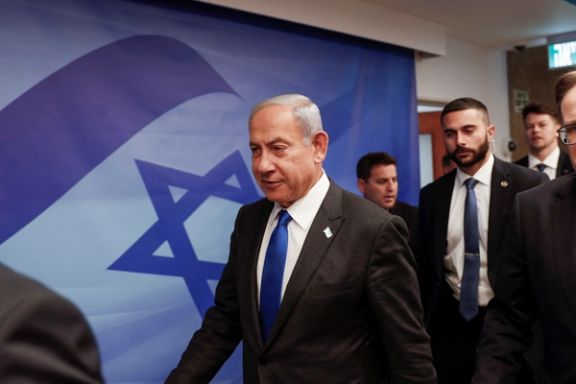
Israeli Prime Minister Benjamin Netanyahu spoke with Russian President Vladmir Putin Sunday, after Putin’s visit to the region and a trip by Iran’s president to Moscow.
Netanyahu cut short a cabinet meeting to speak with Putin on the phone an hour about Israeli hostages in Gaza and the crisis in the Middle East. He voiced “robust disapproval” of Russia’s “dangerous cooperation” with Iran, echoing concerns repeatedly voiced by the United States.
Russian and Iranian military cooperation has widened since the invasion of Ukraine. Tehran has delivered hundreds of Kamikaze drones that have been used against Ukrainian civilian and infrastructure targets. Russia is also poised to deliver advanced fighter planes to Iran and possibly receive ballistic missiles.
Criticizing Russian statements attacking Israel for its military operation in Gaza, Netanyahu told Putin that any country would have responded as Israel has to the October 7 Hamas attack and the killing of more than 1,000 Israeli civilians and the taking of hostages.
Netanyahu reportedly asked Putin to use his influence to help the 138 remaining hostages, including pressure on the Red Cross to pay humanitarian visits to the captives.
Putin traveled to the United Arab Emirates and Saudi Arabia this week and returned to Moscow to receive Iranian President Ebrahim Raisi. The two held talks for three hours on Thursday and discussed the Middle East crisis. Iran and Qatar are pushing for a ceasefire in Gaza, that Israel and the United States say would simply help Hamas to survive and lead to more crises in the future. It is not clear if Putin’s diplomatic meetings were an important part of what he discussed with Netanyahu.
In the meantime, there was a serious flare up of fighting between the Lebanese Hezbollah and Israeli forces on the border of the two countries. Hezbollah said it had launched explosive drones at an Israeli command position on Sunday and extensive Israeli air strikes hit south Lebanon.
The Israeli army said "suspicious aerial targets" had crossed from Lebanon and two were intercepted. Two Israeli soldiers were moderately wounded, and several others lightly injured from shrapnel and smoke inhalation, it said.
Israeli fighter jets carried out "an extensive series of strikes on Hezbollah terror targets in Lebanese territory", it said.
Although Hezbollah was initially expected to join the war to help Hamas by dividing Israeli forces, it has stayed out of large-scale hostilities, launching occasional and limited attacks on Israeli forces near the border. It has not fired any of its tens of thousands of missiles at Israel civilian targets.
Hezbollah’s cautious behavior follows Iran’s reluctance to directly get involved in military hostilities to help Hamas. Tehran has tried to shake off accusations that it greenlighted the Hamas attack, but its proxies have launched nearly 100 attacks against US and Israeli targets, in addition to attacks on commercial and military vessels in the Red Sea.
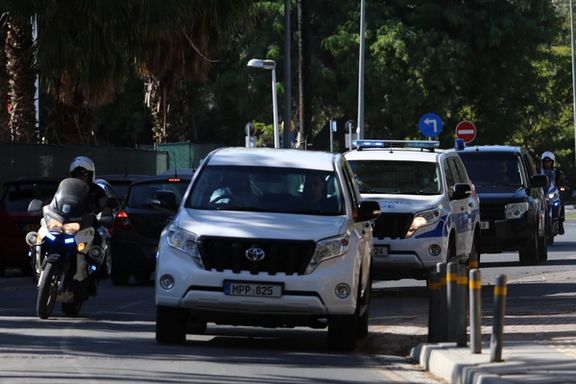
Two Iranians have been detained in Cyprus for questioning over suspected planning of attacks on Israeli citizens living in Cyprus, a Cypriot newspaper reported on Sunday.
The two individuals were believed to be in the early stages of gathering intelligence on potential Israeli targets, the Kathimerini Cyprus newspaper said without citing sources.
The paper added that the Iranians were political refugees in contact with a person linked to the Iranian Revolutionary Guard.
A senior Cyprus official declined to comment, citing policy on issues concerning national security.
Barely a 40-minute flight from Israel, Cyprus is a popular holiday and investment destination for thousands of Israelis.
Also on Sunday, Israeli Prime Minister Benjamin Netanyahu said the Israeli intelligence service Mossad helped Cyprus foil an Iranian-ordered attack against Israelis and Jews on the island, saying such plots were on the rise since the Gaza war erupted.
Israel is "troubled" by what it sees as Iranian use of Turkish-controlled northern Cyprus "both for terrorism objectives and as an operational and transit area," the statement added.
Netanyahu also said in June that an Iranian attack against Israeli targets in Cyprus had been thwarted. Iran has been implicated in many assassinations, kidnappings and terror attacks abroad against dissidents and opponents.
In the past, Israel and Cyprus have worked together to foil Iranian attacks on Israelis. Two years ago, an Azeri national with a Russian passport, who was acting on behalf of the Iranian Revolutionary Guards, was arrested by Cypriot intelligence services. The hitman was hired to kill an Israeli businessman.
Earlier this year, the IRGC accused Israel of assassinating its military adviser Milad Haydari with an airstrike in Syria, vowing to retaliate.
(With reporting by Reuters)

Iran and Saudi Arabia will start formal talks next week to resume direct scheduled flights between Tehran and Riyadh and other cities, an Iranian official said.
"There are no restrictions regarding the launch of direct flights from Tehran to Riyadh, or other cities," Deputy Minister of Roads and Urban Development Mohammad Mohammadibakhsh told the state-affiliated news agency ILNA on Sunday.
Regular flights would be another step towards restoring ties between the two Middle Eastern rivals. A Chinese-mediated agreement in March restored diplomatic relations after years of tension that threatened the security of the entire region and fueled conflicts in Iraq, Syria and Yemen.
"A bilateral working group will start final negotiations next week to have non-haj flights between the two countries," he said, referring to the annual Muslim pilgrimage to the holy city of Mecca in Saudi Arabia.
There have been no regular direct flights between the two countries for years. Currently, only occasional direct flights take off from Iran carrying haj pilgrims.
Mohammadibakhsh said a resumption of flights would include travel for pilgrims of the year-round Umrah -- which can be undertaken at any time year -- and also non-religious travel.
Iran had already presented a list of airline companies which might operate flights, he said, but did not specify any.
Shiite-dominated Iran and Sunni Persian Gulf monarchy Saudi Arabia cut ties in 2016 over Saudi Arabia's execution of a Shiite Muslim cleric and the subsequent storming of Riyadh's embassy in Tehran.

Controversy has erupted in Iran after hardliners demanded specifically designed gowns conforming to hijab rules to be made compulsory in hospitals and operating rooms.
Twelve versions of Islamic surgical gowns have been designed for female patients in the operating room to comply with Sharia rules, announced Mohammad-Hossein Taheri-Akerdi, the secretary of a state body responsible for promotion of Islamic standards, whose main concern has always been promotion of hijab.
Taheri-Akerdi said Tuesday that the standard clothing currently worn by patients in hospitals violates women’s “dignity” and responsible government bodies have been instructed to identify the standards of religiously required and forbidden aspects in respect to “hijab and chastity” in hospital environments.
The entity that Taheri-Akerdi represents is a state-funded organization with a budget of 1.25 trillion rials (around $2.5m) in the current fiscal year, with an increase of 125 percent compared to the previous year. An even higher budget is expected to be allocated to the organization for the next year.
Not only those who oppose the compulsory hijab, but also many religious people are against the various measures that religious fundamentalists are employing to enforce the hijab rules.
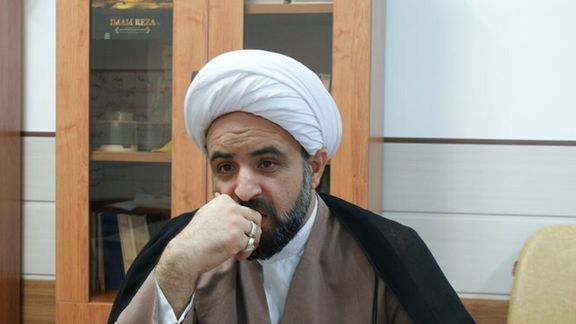
“One feels like standing in front of a hidden camera and waiting for someone to say that this [situation] is just a joke, but no, these are Taheri-Akerdi’s exact words,” a commentary by Mostafa Danandeh a regular contributor to the conservative Asr-e Iran news website said.
“I don't know how upsetting the reading of these news must be for patients and their families who are dealing with the problems of finding their medication, hospital admission and its costs these days. They see that there are people in this country who are looking for Islamic surgical clothes instead of worrying about availability of medicine and the conditions of hospitals,” he wrote.
He added that he thinks the entity that seriously needs reform is the same organization that needlessly tries to impose obscure religious standards and trying to anger people with its decisions.
Some clerics and Islamic scholars such as Ayatollah Seyed Mohammad-Ali Ayazi, a member of a reformist clerical association in Qom, have also criticized the demand for Islamification of hospital gowns.
In an interview with Salamat News (Health News) Thursday, Ayazi criticized fundamentalists and said from the religious point of view demanding Islamic hospital gowns to be designed is a matter of minimal importance when both doctors and patients must deal with such serious problems as shortages of medicine and equipment.
Some media and social media users have pointed out that there may be a hidden agenda in the official’s declaration about unsuitability of current hospital gowns and need for designing Islamic ones.
“But the point that has not been paid much attention to is this story’s economic aspect like the open and hidden financial dimensions of government measures in regard to hijab clothing … and in whose pockets the profits find their way?” a commentary in Faraz Daily, a news website, wrote Saturday.
Faraz Daily mentioned in its article that there are no official data on the market turnover of hijab clothing such as fabric for making the long black veils, called chador in Persian, that is largely imported.
The article also pointed out that the secretary of the Cultural Council said in September 2022 that the black veil was “an essential commodity” and said the government must encourage importing fabrics for the veils by lowering import tariffs. In addition, when a commodity is listed as essential, importers can receive foreign currency from the government at preferential lower rates. This practice has been a major source of corruption in recent years.
A black veil made with imported fabric can cost as high as 20m rials ($400), with the cheapest ones made with domestically produced fabric costing around one-third of that.